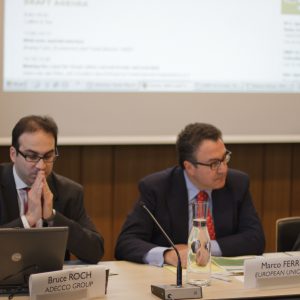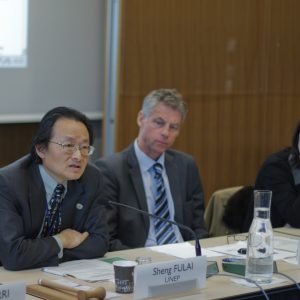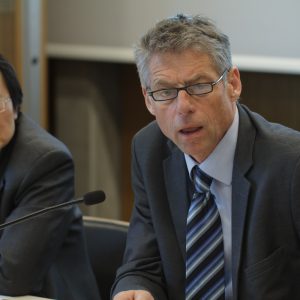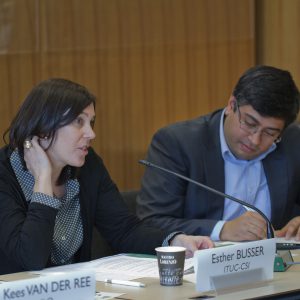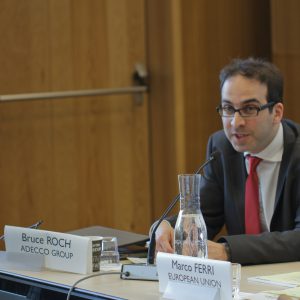Événement
Green Jobs and Youth Roundtable

24 Apr 2012
10:00–12:00
Lieu: International Environment House 2
Organisation: Geneva Environment Network
With one in three unemployed persons today between the ages of 15 and 24 years, governments are called on to shift priorities toward greater investment in youth. The green economy as an approach to sustainable development may offer job opportunities for youth, provided policies are well designed and implemented. This goes along with investing in clean technologies and new markets that create the demand for jobs. Support to national and international efforts aimed at all-inclusive education, vocational training, skills upgrading, youth entrepreneurship promotion and greening work place practices are key components of the policy response.
The Geneva Environment Network, in collaboration with various organizaton, organized an event focusing on the potential of greening economies and its contribution to addressing the worsening youth employment crisis. The panelist shared experiences and practices on: what should be done beyond policies or needed to create strategic partnership and cooperation across the board (UN, development agencies, public and private sectors) to deal with the worsening youth employment crisis; lessons to be drawn from National Development Visions to attaining economic and employment growth as a whole and for young people in particular; and what needs to happen in order to make job-generating growth a key target of national and global green economic policy.
Presentations and discussion
The power points and speaking points used during this event can be dowloaded at the bottom of this mage.
ILO (ppt available)
Kees Van Der Ree from ILO remembered that global unemployment reached 200 million, while that of youth reached 75 million. Also there are 150 million young working poor. There is a huge unemployment pressure, especially among the youth (70%, Kenya).
According to Mr. Wamoto Peter from Permanent Kenya Mission, Kenya is trying hard to tackle youth unemployment issue with different policy schemes. For example, Youth Fund program train youth entrepreneurs so that they could be able to do their own business as well as getting jobs in the market. So far, this scheme is regarded as successful. Policy coherence remains as a major challenge.
ILO is currently conducting country assessment to figure out job creation net effects of green economy. Job creation potential as well as youth unemployment should be dealt by both Supply and Demand side point of view.
European Union
Marco Ferri from the European Union Delegation declared that in the EU, youth unemployment hit 5 million (almost 20%). On the other hand, vacancy remains unfilled. Companies find hard to find people with relevant skills. However, longterm prospect is rather optimistic from 2012 to 2020. As babyboomer generation will retire, 73 million jobs will be opened to the current generation. Still, next crises might be that companies cannot find people with skills. With EU2020, European Union provides supportive role to its member states.
EU can role as a supporter for the member states in the following 4 areas.
1. Prevent early school leaving – education & training
2. Develop skills that are able to get a job: solve Supply & Demand mismatch/ recognizing informal skills. Boyscout is a good example on how to recognize informal skills, linking between education and training and employment
3. 1st experience on the job training. (Apprenticeship(Stagiar) training; Build frameworks on what is traineeship; demand driven training)
4. Facilitate mobility between countries
In conclusion, there are still green skills gaps existing. (People do not have skills requested by labor markets. It’s important to prepare young people with skills required for the green economy.
Move to achieve. Every year the European Union supports more than 400,000 young people to work, train and study abroad. This website lists a complete range of EU tools to help your dreams become reality. European Commission Website for youth: http://ec.europa.eu/youthonthemove/
Scout movement (ppt available)
Tirumale Srinath from the Scout movement recalled that Scouting facilitates activities on green jobs as well.
Scouting has been providing education on environment, climate adaptation and mitigation, environmental decision-making, etc. Also Scouting empowers individuals to be good global citizen as well as local citizen. As glocal scouting ‘s scheme depicts, “Think globally, Act locally”. Scouting also tries to accumulate best practices regarding green jobs in the website. Scouting seeks to nurture youth with green passion and innovation.
ITUC-CSI (doc available)
Esther Busser from ITUC-CSI ITUC together with IOE, ILO, and UNEP struggles to tackle youth unemployment crisis. Young people as equal citizens suffer from not only unemployment, but also under-employment. Thus it is important to create decent jobs for youth. Also, it’s not just creating green jobs, but also greening of existing jobs. These days, many developing countries also adopted green industrial policy.
Africa puts priority on basic services, sanitation, and transport for their citizens to access basic needs. Asia pacific countries focus on natural resource, agriculture, forest, and water. Here, what matters are, more returns in terms of jobs should be achieved when investment is made.
Together with creating green jobs, relevant training and education should be provided to youth. Education and training for youth, Life-long learning procedure, Combination of training and work are all needed.
Financial support and investment on youth is also important part. ITUC is also fiercely promoting to gather money to invest on youth for both social protection and green economy.
In conclusion, Global society should be committed to create green jobs. ITUC is currently making an effort to deliver this issue in Rio+20 conference.
Adecco group (ppt available)
Bruce Roch from the Adecco Group said Adecco’s 60% work force are assigned to young people. Stakeholder made a concensus on this; aspiration of youth for green can turn economy differently. Adecco’s one of strength is matching people’s skills with jobs that require those skills. Adecco accordingly hires people with disability for the recycling, with many other examples.
Jacob Muelhens from DIS Key ACCOUNT MANAGEMENT (Adecco Group) said Adecco Brands Germany was awarded as best employers. Growing the share of wind energy industry, Adecco trains employees to become wind energy experts, looking for both hard skills and “soft”skills.
AGENDA
9:45-10:00
Co ffee & Tea
10:00-10:15
Welcome and Introduction
Sheng Fulai, Economics and Trade Branch, UNEP
10:15-10:35
Making the case for Green Jobs: current trends and potential
Kees van der Ree, Job Creation and Enterprise Development Department, ILO
10:35-10:45
EU strategy to promote employment and combat unemployment
Marco Ferri, First Counsellor, Delegation of the European Union
10:45-10:55
Voices of Youth on employment
Tirumale Srinath, World Organization of the Scout Movement
10:55-11:05
Multi-sectoral collaboration and partnership for youth employment
Esther Busser, Assistant Director, Geneva Office, ITUC-CSI
11:05-11:15
Green jobs: work and career opportunities for youth
Bruce Roch, Manager, Corporate Social Responsability, Adecco Group
Jacob Muelhens, DIS Key Account Management
11:15-11:50
Questions and answers
11:50-12:00
Wrap up and Closing
More details and documents
https://www.genevaenvironmentnetwork.org/wp-content/uploads/2020/05/unep-ilo_event_24_march.pdf
https://www.genevaenvironmentnetwork.org/wp-content/uploads/2020/05/youthgreenjobs.doc



